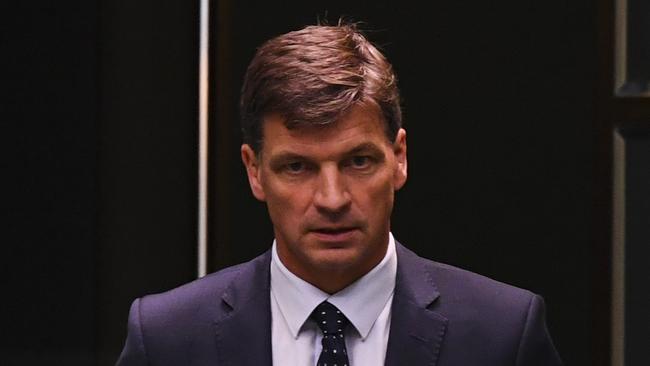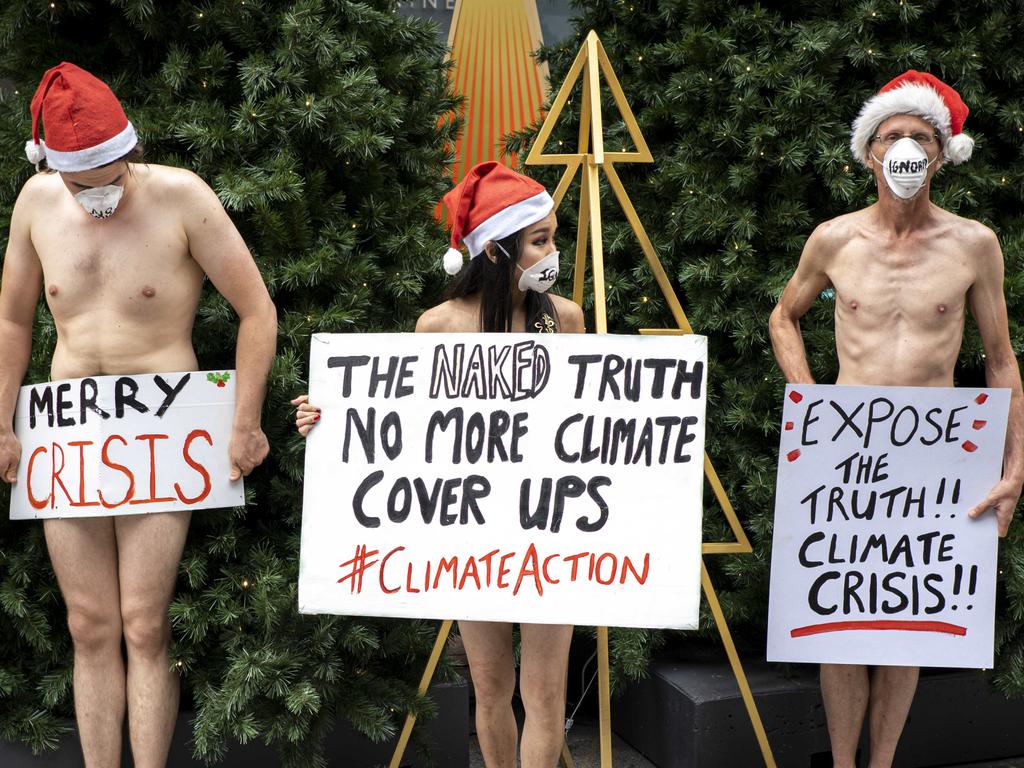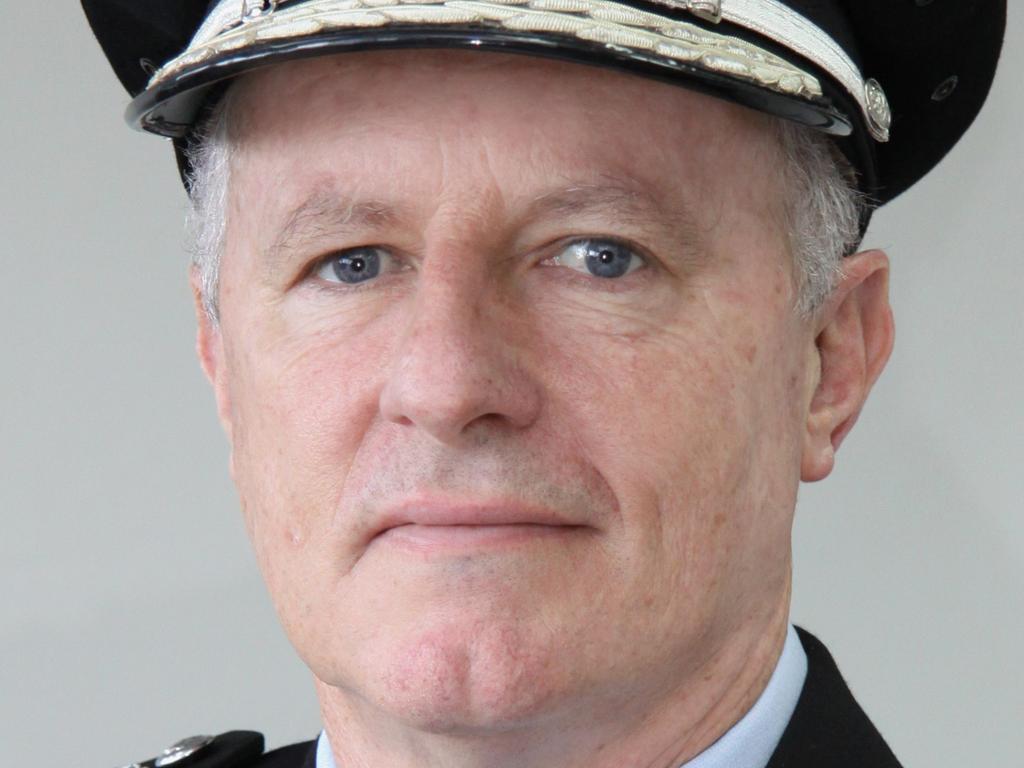Climate pressure ‘doomed to fail’, says Angus Taylor
Angus Taylor has warned better technologies, not tougher government imposts, are needed to meet emissions-reduction targets.

Energy Minister Angus Taylor has warned that “top-down” pressure from the UN to address climate change will fail and better technologies — not tougher government imposts — are needed to meet emissions-reduction targets.
Defending Australia’s record on cutting carbon dioxide emissions, Mr Taylor said the evidence was that most countries would reject climate change policies that added substantially to the cost of living, destroyed jobs, reduced incomes and impeded growth.
“There are serious limits to pressuring countries into aggressive top-down targets without offering clear pathways to deliver,” Mr Taylor, the minister responsible for emissions reductions writes in The Australian.
“Many countries understandably see that as negative globalism, and a gross infringement on their national sovereignty.’’
Mr Taylor, writing in the wake of stalled UN climate negotiations in Madrid in December, said the focus should be on finding productive technologies and practices that delivered emission abatement while maintaining or strengthening economic growth.
Official notice from the US that it would leave the Paris Agreement in November has dogged recent climate talks.
Australia, Brazil and Saudi Arabia were singled out for blocking progress in Madrid.
Australia was criticised by climate groups for wanting to count extra credits from the Kyoto round two process towards its Paris Agreement goals.
Mr Taylor has defended the policy, saying there was less carbon dioxide in the atmosphere because of the work of Australian households, farmers and businesses.
“Over-delivery (on Kyoto 2) should be recognised by the world in assessing and setting future obligations,’’ he said.
Criticism at the Madrid meeting was not confined to the US, Australia and Brazil. “Other major economies like China, Japan and India seemed content to stay complicit on the sidelines,” the World Resources Institute said.
As a result, the UN climate agenda increasingly was at risk of becoming a EU-led project.
Mr Taylor said Australia’s performance was not a major part of talks in Madrid. Domestic emissions cuts compared favourably with other nations, and Australia was contributing to international savings through the export of cleaner fuels such as liquefied natural gas, he said.
Mr Taylor said Australia was responsible for only 1.3 per cent of global emissions and could not have a meaningful impact without co-operation of the largest emitters such as China and the US.
He said Australia had done better than similar countries such as Canada and New Zealand.
Since 2005, Australia’s emissions had fallen 12.9 per cent compared with 2 per cent in Canada and a rise of 4 per cent in New Zealand.
In that time, China’s emissions had risen 67 per cent and India 77 per cent.
Both countries have insisted on the delivery of a promised $100bn a year in climate funding from the developed world before deciding on any further action.
In addition, as part of negotiations for new rules to govern international carbon-trading markets, developing nations want a percentage of the value of global trade to be collected and put aside for climate programs and mitigation.
Mr Taylor said the main focus of the Madrid meeting had been on how to make international carbon markets work.
This was not directly relevant to Australia because it did not trade international permits.
The meeting closed without progress on the key agenda items. Countries failed to agree on the final elements of the Paris rulebook or guidelines to bring the Paris Agreement into operation.
Little progress was made on support and finance for developing countries.
Ireland was the only country to increase its pledge to the Green Climate Fund to which Australia has said it will make no further contributions.
No agreement could be reached on long-term climate finance that developing nations expect will raise more than $100bn a year from next year. And after a marathon session in Madrid, a decision on the rules for international carbon markets was postponed until 2020.
Australia has been supportive of getting an outcome on a global carbon market, despite currently not having any exposure to the scheme.
Brazil, India, Russia and China have signalled they are not interested in a global scheme unless their historical credits under the Clean Development Mechanism were recognised.
This has led to accusations of double counting.
Under the Paris Agreement, countries have to revisit their climate plans by 2020, but most are not compelled to enhance them.
At the insistence of the US, Brazil and China, the final communique in Madrid simply recalled the Paris Agreement commitment that they “communicate or update” their climate plans by 2020.
Countries were urged to consider the gap between existing commitments and what was needed to limit warming “well below 2C”, with a view to “reflecting their highest possible ambition’’.
Most countries are under no obligation to revisit their ambition to cut greenhouse gas emissions levels until 2025.
Mr Taylor said Australia was already ahead of its 2030 targets without taking account of any technology improvement or action by state governments.
He said Australia would increase its emissions-reductions targets only if it was sure the new targets could be met.
He said there was enormous potential in established and emerging technologies such as hydrogen, carbon capture and storage, biofuels, lithium production and waste to energy.








To join the conversation, please log in. Don't have an account? Register
Join the conversation, you are commenting as Logout